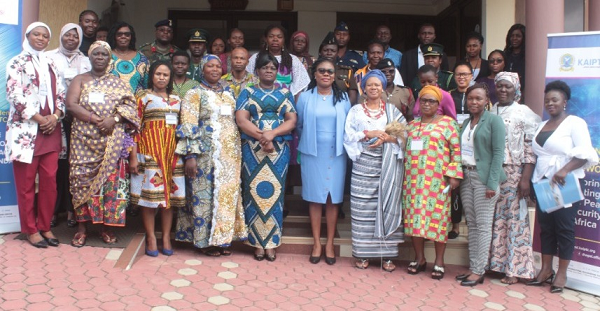
KAIPTC trains local actors on women, peace and security monitoring and reporting
The Kofi Annan International Peacekeeping Training Centre (KAIPTC) Women, Peace and Security Institute (WPSI) with funding from the Swedish and Norwegian governments, has organised a training of trainers’ (ToT) workshop for stakeholders and national actors to support with monitoring and reporting on the implementation of the Women Peace and Security Agenda in Ghana.
The training formed part of activities under the Continental Results Framework (CRF) for monitoring and reporting on the implementation of the Women Peace and Security (WPS) Agenda in Africa.
Advertisement
The objective of the CRF was to enhance regular and systematic monitoring and reporting of the WPS agenda in Africa and to contribute to closing the gap between WPS policy commitment and implementation in Africa.
It was to build the capacities of relevant actors in Member States on the CRF to ensure the effective implementation of the framework and promote the full participation of women in peace and security issues on the continent.
Participants
The participants drawn from the security agencies, the ministry for Gender, Children and Social Protection, Local Government, district assemblies, Civil Society and youth Organisations, traditional leaders, national peace council and the National Disaster Management Organization from the Northern, Upper East, Upper West, Greater Accra, Bono, Savannah and Ashanti Regions.
The training was to offer participants general guidelines on the preparation of National Action Plans for the localization and implementation of the UN 1325, and on reporting using the CRF.
The United Nations Security Council Resolution (UNSCR) 1325 is the first formal and legal UNSCR document that addresses the plight of women and girls in conflict situations.
Protection
Addressing the participants, the Head of Domestic Violence Secretariat at the Ministry of Gender, Children and Social Protection, Maloni Asibi, said the UNSCR 1325 called or special measures to protect women and girls from Gender-Based Violence, particularly rape and other forms of sexual abuse in situations of armed conflict and respect the rights of women and girls in conflict and post-conflict situations.
She said the resolution also sought to increase women’s participation through gender perspectives in conflict resolution, peacekeeping, “peace building and ending prevalent impunities within societies by prosecuting perpetrators of sexual and other forms of violence against women and girls.”
Risks
According to her, even though Ghana has been recognized across the world as a relatively peaceful country, “it has had pockets of recurrent conflicts which have resulted into violent clashes.”
These conflicts, she explained, have revolved around chieftaincy, ethnic, land and party politicking as well as crimes such as armed robbery and “have negatively impacted the peace and security of women in the country over the years.”
Victims
During conflicts, Ms Aibi said even though men and women were adversely affected, “the inequalities that exist make women, girls and persons with disabilities more vulnerable as they are disproportionately affected by the violence that erupts from the conflicts.”
She said women were major stakeholders in conflict prevention, peacemaking, and peacekeeping as they were often the first to notice the rising tensions that could escalate into violence.
“Ironically, women around the world continue to be excluded from peace and political processes because of discrimination, social stereotypes and institutional obstacles,” she observed.
Leadership
Ms Asibi said there was the need for women voices and in the leadership of the peace negotiations.
“When diverse women participate in peace negotiations, the quality and durability of peace agreements increases, and when women are signatories of peace agreements, they are more likely to be implemented.
“As a country committed to the Sustainable Development Goals, we must make a difference in attaining gender balance for sustainable development. The principles of equality, non-discrimination and fair distribution of the benefits of development should be our focus in order to enhance peace and security.
Advantage
In her welcome address, the Director of Policy, Planning, Monitoring and Evaluation Department of KAIPTC, Honame Noagbesenu, urged the participants to take advantage of the opportunity to enhance their knowledge on the WPS agenda as well as to enhance their skills in using the CRF in their quest to report and monitor the implementation of the women, peace and security agenda.
She said the objective of the training was to guide participants to outline a comprehensive roadmap on operationalizing the CRF in Ghana and to enhance local actors’ commitment to report on Ghana National Action Plan on UNSCR 1325.
She was grateful to the Government of Sweden and Norway for their continued support to promote the Women, Peace and Security in Africa and the Office of the Special Envoy of the AUC and the Ministry of Gender Children and Social Protection for their support for the training.



